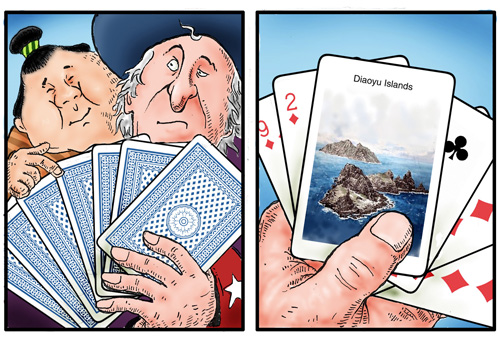Asia-Pacific will pay a high price for Diaoyu Islands
- By Catherine Wood
 0 Comment(s)
0 Comment(s) Print
Print E-mail China.org.cn, September 21, 2012
E-mail China.org.cn, September 21, 2012
Xi Jinping, future leader of China's Communist Party, commented on China's response to Japan's recent purchase of the Diaoyu islands. Xi stated that the purchase of these islands is "a farce" and urged Tokyo to "rein in its behavior." Tokyo, on the other hand, maintains that Japan has settled this dispute by purchasing the islands from a private Japanese owner for just over US$26 million. Yet it seems this so-called purchase will cost all of the Asia-Pacific much more than that before the issue gets resolved.
|
|
|
Wild card [By Zhai Haijun/China.org.cn] |
The Chinese backlash to this dispute is apparent in numerous ways, but what exactly are the islands ultimately worth to both governments? For better or worse, China and Japan, Asia's first and second largest economies respectively, are dependent on one another to maintain economic growth and stability. China purchased 20 percent of all Japanese exports in 2011, and the 2012 year-to-date figures show that China has purchased a noteworthy US$73.54 billion worth of Japanese exports. However, Chinese boycotts are beginning to hurt Japanese exports and as a result of the island purchase, further export purchases are expected to continue on a downward trend for the remainder of the year.
Analysts suggest that there will be noticeable declines in trade between the two Asian leaders over the next six months. The effects of this trend are already being felt by Japanese companies who export goods to China. China is home to a massive consumer group for Japanese electronics and is presently the world's largest market for automobiles [another leading Japanese export.] Retail stores are reporting a sudden decline in Japanese electronic brands and year on year reports show a 2 percent decrease in the purchase of Japanese automobiles across China. To juxtapose this Japanese automobile downfall, imports from other auto producing nations have significantly increased: 25 percent comes in from Germany, 19 percent from the US, 12 percent from South Korea, and 4 percent from France. Being outsold on the Chinese market is a big problem for the Japanese automobile industry.
This is not, however, a single-sided issue and it is important to note that in the first half of this year, Japan purchased US$91.29 billion in exports from China. In light of the recent economic slowdown in the European Union and the United States - China's first and second largest consumer markets respectively - China has been forced to reexamine its manufacturing sector and adjust national growth goals accordingly. Goldman Sachs has lowered their estimation for China's yearly growth from 8.0 percent down to 7.6 percent and reports suggest that this trend will continue to stunt growth well into 2013. Furthermore, People's Bank of China, China's central bank, has decreased its required reserves and lowered interest rates already two times this year, marking the first interest rate decrease since 2008. Combined with yet another economic stimulus from Beijing, these initiatives have produced sub-satisfactory results and initiated a new concern: inflation. China needs export markets to revamp growth and reverse these ongoing trends.
Japan was one of the first, and remains, one of the largest foreign direct investors in China. It is exactly because of this, that a great deal of Chinese jobs and government tax revenues depend on continued Japanese trade relations. In the long term, disputes like this will slow down progress, not only for China and Japan, but for all of Asia and potentially the rest of the world. Both of these economies are codependent for sustained growth and with declining exports to both the EU and the United States, this island disagreement could spell disaster for both countries.
So how much are these islands really worth?
The islands are of intrinsic value because of their proximity to both countries. The administration of the islands would be entitled to all mineral resources, fishing locations, and control of the navigable waterways. Some industrial advances could be expected as the islands are developed, but at the end of the day, there isn't anything really special about them. The simple economic truth is that these islands are worth much less than the 40-year-old normalization of trade between China and Japan. Last year marked a 15 percent growth in trade which eventually capped out at US$344.9 billion. With this in mind, both countries are risking that profitable relationship over islands which were just purchased for UD$26 million. This adds a new perspective.
The reality of the situation is that both countries stand to gain less from ownership of those islands than they do from trade with each other. Look at the numbers, consider the facts, and you will see that the islands aren't worth the strained relationship.
The author is a freelance writer currently based in Beijing.
Opinion articles reflect the views of their authors, not necessarily those of China.org.cn






